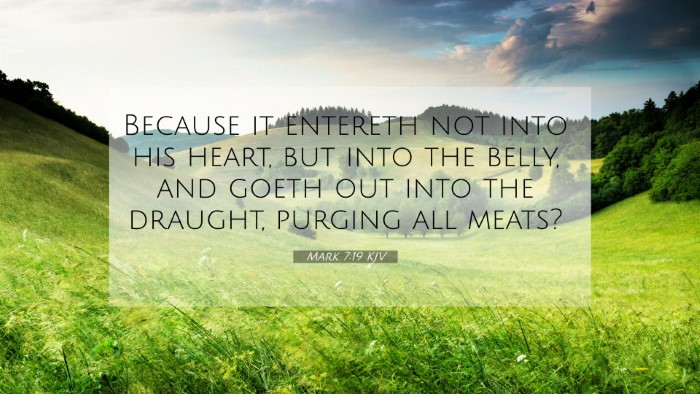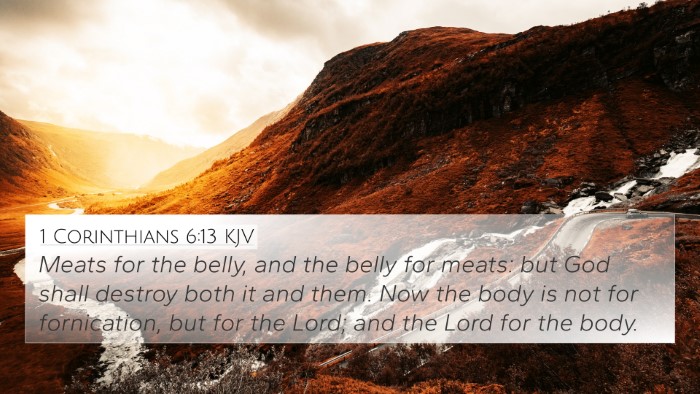Understanding Mark 7:19 – A Comprehensive Analysis
Mark 7:19 states: "Because it entereth not into his heart, but into the belly, and goeth out into the draught; purging all meats." This verse highlights significant theological insights regarding dietary laws and what constitutes true defilement before God. Below, we explore a synthesis of insights from renowned Bible commentaries to foster a deep understanding of this passage.
Verse Contextualization
In the broader context of Mark 7, Jesus confronts the traditions of the Pharisees concerning ritual cleanliness. He emphasizes that external actions or dietary restrictions do not define a person's holiness, but rather, it is the inner condition of the heart that matters.
Meaning and Insights
-
Matthew Henry's Commentary:
Henry elucidates that the act of consuming food does not affect the inner purity of an individual. The physical food only influences the body, and its consumption is not the source of spiritual defilement. True defilement arises from within, as what comes out of a person's heart—such as evil thoughts and wicked actions—truly defiles them.
-
Albert Barnes’ Notes:
Barnes emphasizes that Jesus declares the abrogation of dietary laws by His interpretation of their significance. The mention of ‘purging all meats’ suggests that the ceremonial laws are no longer binding, and what truly corrupts a man are his intentions and sins, not what he eats.
-
Adam Clarke's Commentary:
Clarke elaborates that Jesus is exposing the groundless nature of the Pharisees’ concerns with food rituals. He notes that the “draught” refers to the waste disposal, stressing the temporary nature of food and how it does not contribute to spiritual corruption.
Bible Verse Connections
Understanding Mark 7:19 can be enriched by linking it to other Bible verses that explore similar themes:
- Matthew 15:17-20: Jesus reinforces the same message, stating that what goes into the mouth does not defile a man, but what comes out of it does.
- Romans 14:17: Paul teaches that the kingdom of God is not about eating and drinking, but righteousness, peace, and joy in the Holy Spirit.
- 1 Corinthians 8:8: Paul asserts that food does not bring us closer to God; we are neither better nor worse off by what we eat.
- Colossians 2:16-17: Paul cautions against judging others based on food and drink, highlighting that these are but a shadow of things to come.
- Acts 10:15: God declares all foods clean, indicating the removal of previous dietary restrictions.
- Hebrews 9:10: The writer notes that the old covenant laws concerning food and drink were only temporary regulations until the new order.
- Luke 11:39-41: Jesus criticizes the Pharisees for their external cleanliness while neglecting inner purity and generosity.
Comparative Analysis of Biblical Themes
Thematic connections in the Bible indicate that Jesus’ teaching in Mark 7:19 is not isolated. It can be seen in relation to the following:
- Transformation of the Law: The transition from the Old Testament dietary laws to the New Covenant's principles of grace and truth.
- Inner Spirituality vs. External Rituals: The need for genuine heart change over adherence to traditional rituals.
- The Role of Jesus as Fulfillment: His ministry shifts the understanding of purity and obedience to God.
Tools for Bible Cross-Referencing
To study these connections effectively, consider using tools such as:
- Bible Concordance: Helps identify and locate specific words or phrases across scriptures.
- Bible Cross-Reference Guide: A systematic guide to help users find connections between verses.
- Cross-reference Bible Study: Utilizing a methodical approach to link verses and themes across the scriptures.
- Bible Reference Resources: Utilizing study Bibles and commentaries that offer integrated cross-references.
Practical Applications
As believers, Mark 7:19 invites us to examine our own hearts and motivations. Here are some applicable reflections:
- Evaluate what truly affects your spiritual life—external actions or internal dispositions?
- Engage in a practice of self-reflection about thoughts and intentions, fostering a heart aligned with God's will.
- Embrace the freedom in Christ regarding practices, while grounding yourself in righteousness and love.
Conclusion
Mark 7:19 serves as a pivotal teaching of Jesus that clarifies what defiles a person. By examining related verses and comments from established theologians, we can appreciate the profound message of inner purity over external observance. Employing tools for Bible cross-referencing enhances our understanding and application of these crucial teachings.










